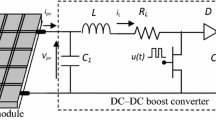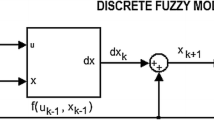Abstract
The paper deals with the application of fuzzy logic in the method of designing the parameters of a continuous dynamic system controller that is energetically optimal and at the same time meets the desired dynamic control parameters. The suitable controller parameters are established on the basis of a fuzzy model of the system, generated through its identification from the measured inputs and outputs. The proposed method has been verified by simulations on an example of parameter design for a PI controller of a DC drive with non-linear load. In comparison with a standardly designed PI controller with constant parameters for the whole operational space of the DC drive it is possible to save approximately 24.39 % of electric power at each dynamic motion of the drive.
Access this chapter
Tax calculation will be finalised at checkout
Purchases are for personal use only
Preview
Unable to display preview. Download preview PDF.
Similar content being viewed by others
References
Vittek, J., Dodds, S.J.: Forced Dynamics Control of Electric Drives. University of Zilina (2003)
Krishan, M.M.: Fuzzy Sliding Mode Control with MRAC Technique Applied to an Induction Motor Drives. International Review of Automatic Control (IREACO), Praise Worthy Prize 1(1), 42–48 (2008)
Babuška, R., Verbruggen, H.B., Hellendoorn, H.: Promising Fuzzy Modeling and Control Methodologies for Industrial Applications. In: Proceedings European Symposium on Intelligent Techniques ESIT 1999, Greece, Crete (1999) AB-02
Takagi, T., Sugeno, M.: Fuzzy identification of systems and its application to modeling and control. IEEE Trans. Systems, Man and Cybernetics 15, 116–132 (1985)
Brandstetter, P., Stepanec, L.: Fuzzy Logic in Vector Controlled Induction Motor Drive. In: Proc. of EPE 2003 Conference, Toulouse, France (2003)
Bourebia, O., Belarbi, K.: Fuzzy Generalized Predictive Control for Nonlinear Systems with Coordination Technique. International Review of Automatic Control (IREACO), Praise Worthy Prize 2(1), 169–176 (2008)
Babuska, R.: Fuzzy Modeling for Control. Kluwer Academic Publishers, Boston (1998)
Xu, Y.L.: Fuzzy model identification and self-learning for dynamic systems. IEEE Trans. Systems Man Cybernet., SMC-17 (4) (1997)
Žilková, J., Timko, J., Kover, S.: DTC on Induction motor Drive. Acta Technica CSAV 4(56), 419–431 (2011)
Author information
Authors and Affiliations
Editor information
Editors and Affiliations
Rights and permissions
Copyright information
© 2013 Springer-Verlag Berlin Heidelberg
About this paper
Cite this paper
Fedor, P., Perdukova, D. (2013). Energy Optimization of a Dynamic System Controller. In: Herrero, Á., et al. International Joint Conference CISIS’12-ICEUTE´12-SOCO´12 Special Sessions. Advances in Intelligent Systems and Computing, vol 189. Springer, Berlin, Heidelberg. https://doi.org/10.1007/978-3-642-33018-6_37
Download citation
DOI: https://doi.org/10.1007/978-3-642-33018-6_37
Publisher Name: Springer, Berlin, Heidelberg
Print ISBN: 978-3-642-33017-9
Online ISBN: 978-3-642-33018-6
eBook Packages: EngineeringEngineering (R0)




